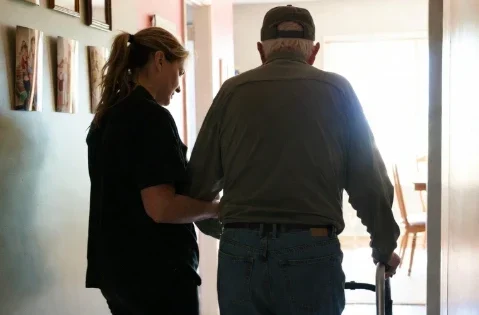Clinical depression is one of the most common mood disorders in the country. According to Mental Health America, clinical depression affects over 19 million Americans every year, regardless of age. Unfortunately, older adult attitudes toward depression diverge from others. Elderly adults are less likely to ask for help. According to a survey conducted by Mental Health America, only about 42 percent of elderly adults seek professional help for depression. According to that same survey, about 58 percent of adults 65 and older actually believe that depression is a normal part of getting older.
Depression is not a natural part of aging, and it is important to seek help for it and surround yourself with people who will provide you with the support that you need. Read on to learn some tips for how to help elderly with depression from our home health aide services.
1. Learn about depression.
Research and public knowledge of depression and mental health, in general, has advanced greatly over the past few years, but there is still a negative stigma attached to mental health disorders. Gaining a better understanding of depression can help to break down those stigmas, allowing for more support and better treatment of depression.
Depression is a mood disorder that is characterized by extreme, persistent feelings of sadness, loss of motivation, and reduced self-worth. These feelings can have a severe effect on a person’s livelihood and prevent them from performing even basic, everyday activities, like eating meals, sleeping, or bathing. It can lead to physical symptoms, like headaches, joint pains, and being more prone to colds. At its worst, untreated depression can lead to a fixation on death and suicidal ideation.
The exact cause of depression is not fully known. Most research points to a mix of brain chemistry and hormonal issues, along with other biological issues, but the disorder is much more complex. Depression is not a choice. A person can’t simply “snap out of” depression, the same way that you can’t snap out of a flu or other disease. This idea is important to internalize. Thinking of depression as a choice can easily fall into blaming a depressive person for their own depression.
2. Learn about depression treatments.
Much like any disorder or disease, depression requires professional treatment. In this case, that may involve a combination of therapy and antidepressant medication. Cognitive-behavioral therapy, also known as talk therapy, allows you to discuss your mental health with a professional therapist or counselor, who can help you develop the right tools and strategies to reduce depression symptoms and identify issues that may contribute to depression.
Medication can help to improve or correct hormonal and chemical balances that contribute to depression. Medication usually involves SSRIs and other antidepressants. Finding the right medication and the right dosage can take some trial and error, which is why it’s important to work directly with your doctor.
Specific treatments can vary from person to person, so something that works for someone else may not have the same effect on you.
3. Be a compassionate listener.
While you can’t replace the work of a professional therapist or counselor, you can still be a good listener. Truly listen to what they are saying and let them talk about their feelings. It’s okay to ask questions and be inquisitive, but it’s more important to offer some encouragement or hope.
Being a compassionate listener does not always mean giving advice. Don’t try to “fix” their depression, which can imply that it should be easy for them to not be depressed. Talk to them without any judgment. Often just the simple act of talking face to face can be enough to reduce symptoms and signs of depression in elderly adults who may be more isolated.
4. Provide help where you can.
Depression can make everyday tasks difficult. Along with being a compassionate listener, offer to help out wherever you can. Offer to cook a simple meal or pay for takeout. Do some simple cleaning around their home. Take them out for a walk around the block for some fresh air and sunshine. Watch their favorite movie with them. These won’t completely cure their depression, but sometimes just having someone there is enough to keep the loneliness at bay.
5. Encourage them to get help.
Even though treatment for depression is highly effective, it can be hard for someone with depression to actively seek help. The disorder drains you of your motivation and energy, so finding a therapist or making an appointment can feel like an impossible task. Depression also operates on negative feedback loops. You are suffering and you believe that you deserve that suffering, so why would you seek treatment for it? That can be even more difficult with seniors who don’t think they need treatment or otherwise believe that they can handle the situation on their own.
Start by suggesting that they get a general check-up with their primary care doctor. A regular doctor visit can seem less intimidating than seeing a mental health professional. A doctor can also perform tests to rule out other potential health issues that may cause depression, like thyroid issues. They can also refer your loved one to a psychologist or psychiatrist.
If your loved one is having trouble committing, help them find a therapist and make an appointment for them. Offer to escort them to their first appointment. Encourage them to make a list of symptoms that they can discuss with their therapist. Help them stay on schedule with any prescription medications.
6. Support their treatment.
Once they do find a therapist or form of treatment that works for them, be supportive of their endeavors. Understand that progress can be slow and that the process can be difficult for everyone involved. There is no magic cure. It takes ongoing work, and even in treatment, a depressive person will have their ups and downs. Encourage them to stick with treatments. If things aren’t working, help them consider other treatment options. Through it all, stay patient and celebrate the victories, no matter how small.
Lead by example yourself. If their depression is tied to substance abuse, avoid using alcohol or drugs around them. Ask them to go out and partake in fun activities. Take them out to dinner. Stay hopeful and optimistic without dipping too far into a “positivity only” mentality or being too forceful.
7. Be patient.
It can’t be emphasized enough. Be patient. Successful treatment does not mean that their depression goes away. It simply means that they have the tools to better deal with depression when it happens. They can still have their bad days, and that’s okay.
That also means not taking things personally. A depressed person may cancel plans, miss appointments, or randomly lash out at you. If that happens, it may take a moment to understand their depression. Take some space for yourself and consider talking to your own therapist about your feelings and the relationship to determine proper strategies.
Depression is an incredibly complex disorder, but with some support and encouragement, you can learn how to help the elderly with depression. The team at Alliance Homecare can also provide in-home nurse care assistance, from preparing meals to providing everyday cleaning services, to take some of the pressure off of a senior’s shoulders. Contact us to learn more today.
Sources:





